Unit 17 Laughter
- 格式:doc
- 大小:308.00 KB
- 文档页数:43
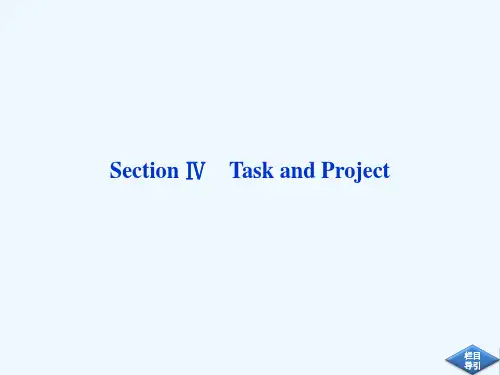
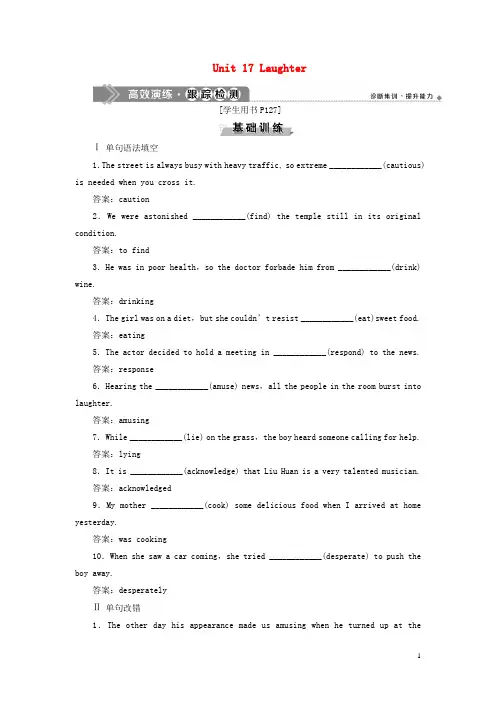
Unit 17 Laughter[学生用书P127]Ⅰ单句语法填空1.The street is always busy with heavy traffic, so extreme ____________(cautious) is needed when you cross it.答案:caution2.We were astonished ____________(find) the temple still in its original condition.答案:to find3.He was in poor health,so the doctor forbade him from ____________(drink) wine.答案:drinking4.The girl was on a diet,but she couldn’t resist ____________(eat)sweet food.答案:eating5.The actor decided to hold a meeting in ____________(respond) to the news.答案:response6.Hearing the ____________(amuse) news,all the people in the room burst into laughter.答案:amusing7.While ____________(lie) on the grass,the boy heard someone calling for help.答案:lying8.It is ____________(acknowledge) that Liu Huan is a very talented musician.答案:acknowledged9.My mother ____________(cook) some delicious food when I arrived at home yesterday.答案:was cooking10.When she saw a car coming,she tried ____________(desperate) to push the boy away.答案:desperatelyⅡ单句改错1.The other day his appearance made us amusing when he turned up at theparty.____________________答案:amusing→amused2.Human beings must live in harmony to nature,or they will suffer from it.____________________答案:to→with3.Parents should manage to forbid their children play computer games.____________________答案:play→playing或play前加to4.You will be convincing of his dishonesty sooner or later.____________________ 答案:convincing→convinced5.He is so a kind person that many people often turn to him for help.____________________答案:so→suchⅢ单元语法——过去完成进行时;进行时态和非进行时态单句语法填空/单句改错1.(2017·浙江卷6月)His father said that the cat must be sick. Benjamin was forced to admit what he ____________(do).答案:had been doing2.(2017·北京卷)She ____________(talk) to her mother about the lives of homeless people since they first saw the homeless man.答案:had been talking3.Due to the hard training they ____________(do) before, their performances were very impressive.答案:had done4.(2017·北京卷)The two didn’t know each other well —Taylor had just ____________(move)to town a month or so before.答案:moved5.(2016·北京卷)Jack ____________(work) in the lab when the power cut occurred.答案:was working6.The girl has been playing the piano for two hours before her mother came home. ____________________答案:has →had7.The plane left at 8:30,but you should check in half an hour ahead of time. ____________________答案:left→leaves8.It is reported that the company would put on a new film in two weeks’ time. ____________________答案:would→will9.He is working in China and he has worked in France for three years. ____________________答案:去掉has10.When I came in,the girl is chatting with her friends on the Internet.____________________答案:is→wasⅠ教材与语法填空根据课文内容,在空白处填入1个适当的单词或括号内单词的正确形式。
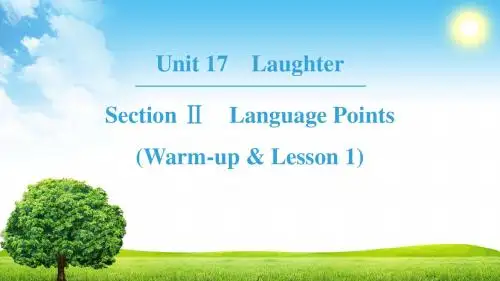
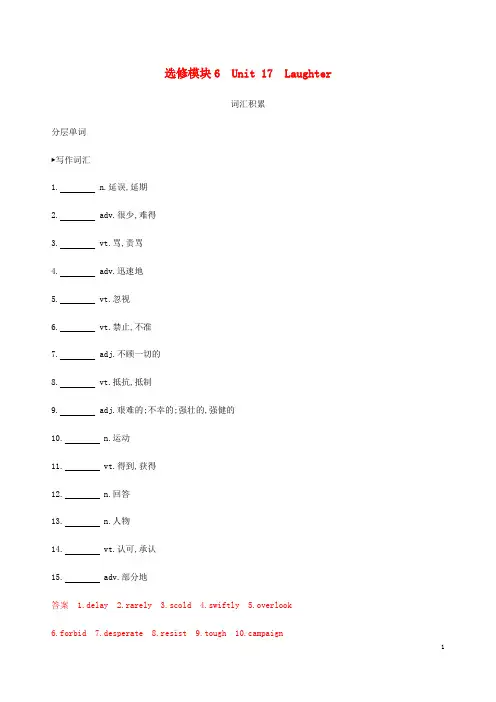
选修模块6 Unit 17 Laughter词汇积累分层单词▶写作词汇1. n.延误,延期2. adv.很少,难得3. vt.骂,责骂4. adv.迅速地5. vt.忽视6. vt.禁止,不准7. adj.不顾一切的8. vt.抵抗,抵制9. adj.艰难的;不幸的;强壮的,强健的10. n.运动11. vt.得到,获得12. n.回答13. n.人物14. vt.认可,承认15. adv.部分地答案 1.delay 2.rarely 3.scold 4.swiftly 5.overlook6.forbid7.desperate8.resist9.tough 10.campaign11.obtain 12.response 13.figure 14.acknowledge 15.partly▶阅读词汇1.yawn vi.2.yell vi.edian n.4.mature adj.5.anecdote n.6.thriller n.7.psychology n.8.ridiculous adj.9.purely adv.pensate vt.11.identification n.ponent n.13.tournament n.答案 1.打哈欠 2.叫喊,叫嚷 3.喜剧演员 4.成熟的5.轶事,趣闻6.惊险小说(戏剧、电影)7.心理学8.荒谬的,可笑的9.完全地;仅仅10. 补偿,赔偿11.身份12.成分,组成部分13.锦标赛,联赛▶拓展词汇1. n.回答→ v.回答,答复2. n.政治家→ adj.政治的→ n.政治3. n.职业,专业→ adj.职业的,专业的4. n.谨慎,小心→ adj.谨慎的,小心的→ adv.谨慎地,小心地5. vt.使相信→ adj.令人信服的→ adj.坚信的,深信的6. vt.使恐惧→ adj.惊恐的,担惊受怕的→ adj.恐怖的,吓人的7. n.协调,和谐→ adj.和谐的,协调的8. vt.抵抗,抵制→ n.抵抗,反抗;抵制→ adj.抵抗的,有抵抗力的9. vt.使惊讶,使惊骇→ adj.令人惊讶的→ adj.感到惊讶的→ n.惊讶10. adj.厌恶的→ n.厌恶,憎恶 vt.使厌恶→ adj.感到恶心的,厌恶的11. vt.逗乐,使(某人)笑→ n.娱乐,消遣;快乐的事→ adj.逗乐的,觉得好笑的→ adj.逗人笑的,好笑的12. adj.不顾一切的;绝望的→ adv.不顾一切地→ n.绝望,拼命13. vt.取得(成功),完成(任务)→ n.功绩,成就答案 1.response;respond 2.politician;political;politics3.profession;professional4.caution;cautious;cautiously5.convince;convincing;convinced6.scare;scared;scary7.harmony;harmonious 8.resist;resistance;resistant9.astonish;astonishing;astonished;astonishment10.disgusting;disgust;disgusted 11.amuse;amusement;amused;amusing12.desperate;desperately;desperation 13.accomplish;accomplishment高频短语1. 令人讨厌2. 导致,造成3. 突然笑起来4. 排队5. 胡闹,瞎弄6. 不管,不顾7. 多亏;由于8.run into9.from time to time10.pull faces11.cash a cheque12.get rid of13.put on14.do sb. good答案 1.turn sb. off 2.result in 3.burst out laughing 4.wait in line 5.fool around 6.regardless of 7.thanks to 8.撞上9.不时地10.做鬼脸11.兑现支票12.处理掉,摆脱 13.假装;穿上(衣服);上演14.对某人有益经典句型1.When asked for his views about his teaching job, Philip said he (发现它很有趣)and rewarding.2.He gave up smoking last year and he (吸烟)for twenty years.3. (还在上小学时), David had already shown admirable acting talent.4.It is unbelievable that Mr. Lucas (过着简朴的生活)despite his great wealth.答案 1.found it very interesting 2.had been smoking3.While still at primary school4.leads/lives a simple life。
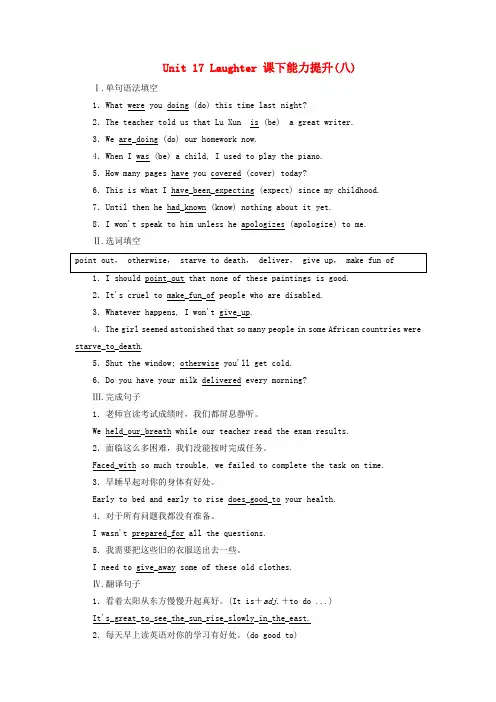
Unit 17 Laughter 课下能力提升(八) Ⅰ.单句语法填空1.What were you doing (do) this time last night?2.The teacher told us that Lu Xun is (be) a great writer.3.We are_doing (do) our homework now.4.When I was (be) a child, I used to play the piano.5.How many pages have you covered (cover) today?6.This is what I have_been_expecting (expect) since my childhood.7.Until then he had_known (know) nothing about it yet.8.I won't speak to him unless he apologizes (apologize) to me.Ⅱ.选词填空I should point_out that none of these paintings is good.2.It's cruel to make_fun_of people who are disabled.3.Whatever happens, I won't give_up.4.The girl seemed astonished that so many people in some African countries were starve_to_death.5.Shut the window; otherwise you'll get cold.6.Do you have your milk delivered every morning?Ⅲ.完成句子1.老师宣读考试成绩时,我们都屏息静听。
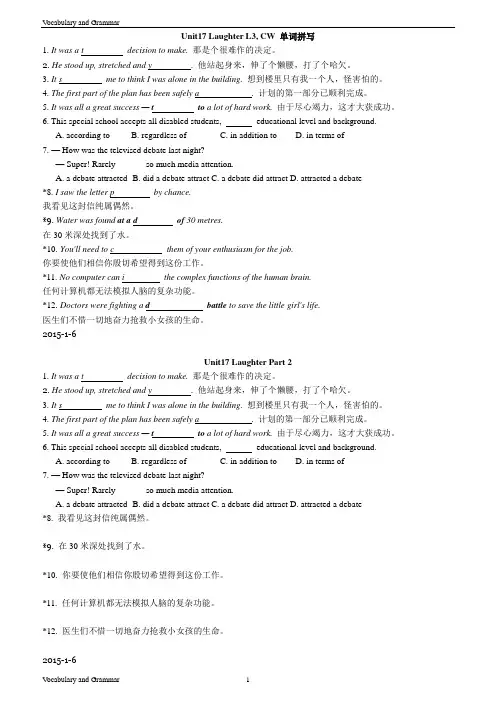
Unit17 Laughter L3, CW 单词拼写1. It was a t decision to make.那是个很难作的决定。
2. He stood up, stretched and y .他站起身来,伸了个懒腰,打了个哈欠。
3. It s me to think I was alone in the building.想到楼里只有我一个人,怪害怕的。
4. The first part of the plan has been safely a .计划的第一部分已顺利完成。
5. It was all a great success —t to a lot of hard work.由于尽心竭力,这才大获成功。
6. This special school accepts all disabled students, educational level and background.A. according toB. regardless ofC. in addition toD. in terms of7. — How was the televised debate last night?— Super! Rarely ______ so much media attention.A. a debate attractedB. did a debate attractC. a debate did attractD. attracted a debate*8. I saw the letter p by chance.我看见这封信纯属偶然。
*9. Water was found at a d of 30 metres.在30米深处找到了水。
*10. You'll need to c them of your enthusiasm for the job.你要使他们相信你殷切希望得到这份工作。
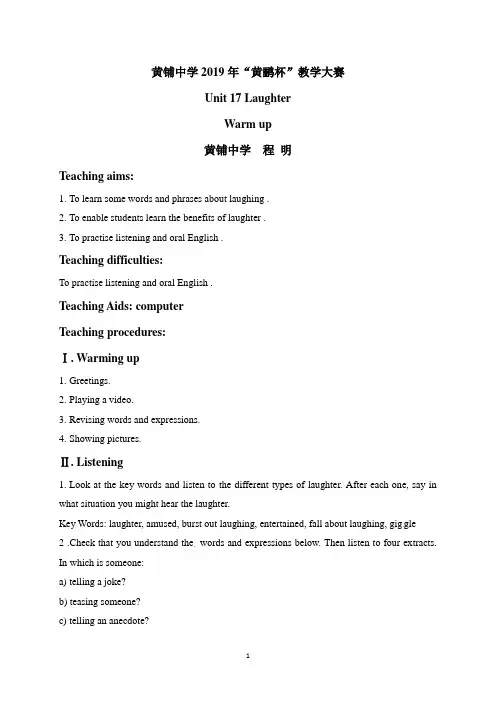
黄铺中学2019年“黄鹂杯”教学大赛Unit 17 LaughterWarm up黄铺中学程明Teaching aims:1.To learn some words and phrases about laughing .2.To enable students learn the benefits of laughter .3.To practise listening and oral English .Teaching difficulties:To practise listening and oral English .Teaching Aids: computerTeaching procedures:Ⅰ. Warming up1.Greetings.2.Playing a video.3.Revising words and expressions.4.Showing pictures.Ⅱ. Listening1.Look at the key words and listen to the different types of laughter. After each one, say in what situation you might hear the laughter.Key Words: laughter, amused, burst out laughing, entertained, fall about laughing, gig gle2 .Check that you understand the words and expressions below. Then listen to four extracts. In which is someone:a) telling a joke?b) teasing someone?c) telling an anecdote?d) describing a ridiculous situation?Ⅲ. SpeakingWork in pairs . Ask and answer the questions below .1. Have you ever giggled w hen everybody else was serious ? When ?2. Do you sometimes laugh when people are awkward or clumsy ?3. Do any of your friends make you laugh a lot ? Why ?4. Have you ever been in a ridiculous situation ? What was it ?5. Do you know anyone who often teases people ?6. Are you good at telling jokes ? Can you tell one in English ?Ⅳ. ReadingWhat is Laughter Yoga ?Laughter Yoga is a fantastic way of keeping fit and 1. ____________(health) . It started in a park in Mumbai in 1995 with just 5 p articipants , and now there are thousands of Laughter Clubs in more than one hundred 2._________ (country) around the world .Laughter Yoga is based __________the principle (原则) that your body benefi ts from laughing even when you petend to laugh . As long as you are willing to laugh , you will get the psychological and physiological benefits of laughter. The good thing is that in laughter exercises the pretended laughter s oon turns into sincere , deep and hearty laughter .Laughter Yoga is 4._________combination o f deep breathing techniques from Yoga and playful laughter exercise. It strenghtens the immune system which not only prev ents you from 5.___________(fall) sick , but also helps to treat a variety of illnesses .Laughter Yoga is now 6.___________(wide) accepted by the medical and scientific world , and l arge organisations are using Laughter Yoga 7.___________(improve) the well-being of their staff .The first Sunday in May is World Laughter Day 8._______Laughter Yoga around the world 9.___________(celebrate) for peace , health and 10._______(happy) . Tens of thousands of people have benefited this practice all over the world .Ⅴ. Proverbs about Laughter。
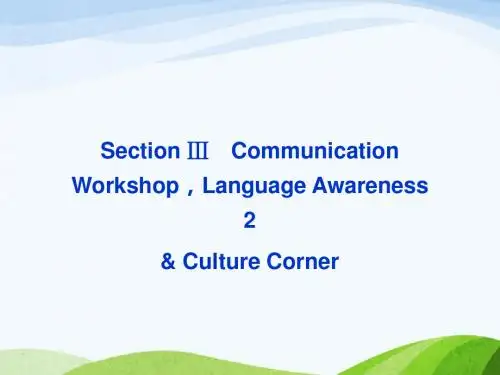
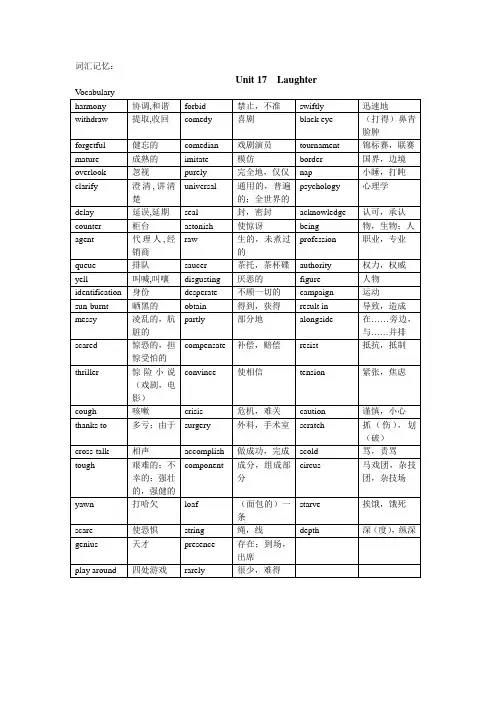
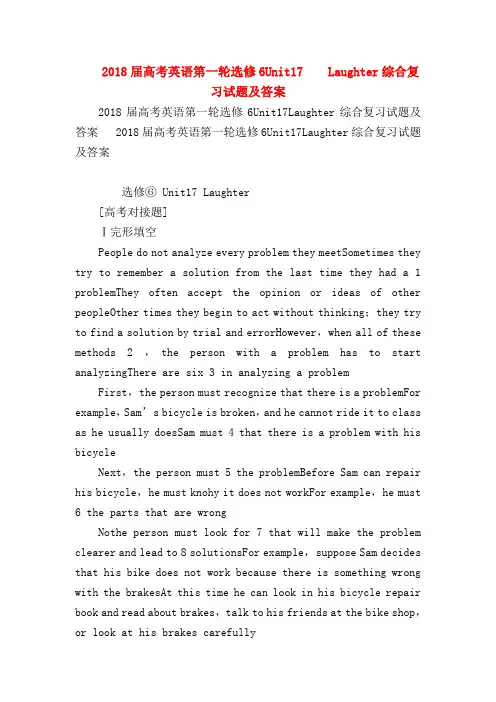
2018届高考英语第一轮选修6Unit17 Laughter综合复习试题及答案2018届高考英语第一轮选修6Unit17Laughter综合复习试题及答案 2018届高考英语第一轮选修6Unit17Laughter综合复习试题及答案选修⑥ Unit17 Laughter[高考对接题]Ⅰ完形填空People do not analyze every problem they meetSometimes they try to remember a solution from the last time they had a 1 problemThey often accept the opinion or ideas of other peopleOther times they begin to act without thinking;they try to find a solution by trial and errorHowever,when all of these methods 2 ,the person with a problem has to start analyzingThere are six 3 in analyzing a problemFirst,the person must recognize that there is a problemFor example,Sam’s bicycle is broken,and he cannot ride it to class as he usually doesSam must 4 that there is a problem with his bicycleNext,the person must 5 the problemBefore Sam can repair his bicycle,he must knohy it does not workFor example,he must 6 the parts that are wrongNothe person must look for 7 that will make the problem clearer and lead to 8 solutionsFor example,suppose Sam decides that his bike does not work because there is something wrong with the brakesAt this time he can look in his bicycle repair book and read about brakes,talk to his friends at the bike shop,or look at his brakes carefully。
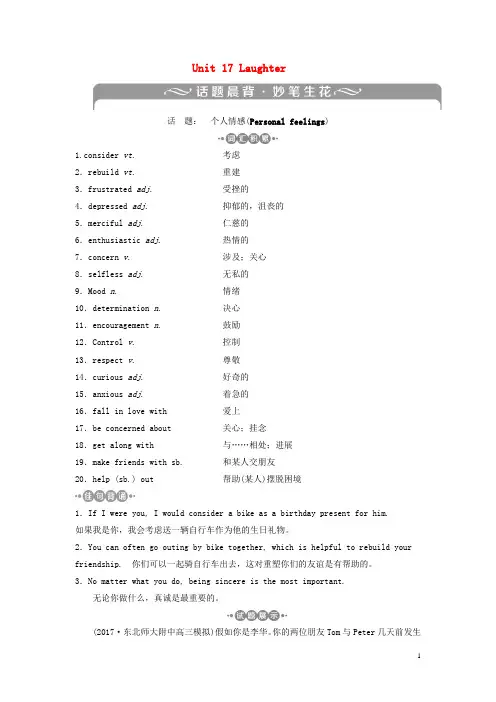
Unit 17 Laughter话题:个人情感(Personal feelings)1.consider vt.考虑2.rebuild vt.重建3.frustrated adj.受挫的4.depressed adj.抑郁的,沮丧的5.merciful adj.仁慈的6.enthusiastic adj.热情的7.concern v.涉及;关心8.selfless adj.无私的9.Mood n.情绪10.determination n.决心11.encouragement n.鼓励12.Control v.控制13.respect v.尊敬14.curious adj.好奇的15.anxious adj.着急的16.fall in love with 爱上17.be concerned about 关心;挂念18.get along with 与……相处;进展19.make friends with sb. 和某人交朋友20.help (sb.) out 帮助(某人)摆脱困境1.If I were you, I would consider a bike as a birthday present for him.如果我是你,我会考虑送一辆自行车作为他的生日礼物。
2.You can often go outing by bike together, which is helpful to rebuild your friendship. 你们可以一起骑自行车出去,这对重塑你们的友谊是有帮助的。
3.No matter what you do, being sincere is the most important.无论你做什么,真诚是最重要的。
(2017·东北师大附中高三模拟)假如你是李华。
你的两位朋友Tom与Peter几天前发生了争吵。
3月9日是Peter生日,Tom想送他一个礼物来缓和关系,修复友情,特地发来邮件寻求你的建议。
Period Two Lesson 2Laughter Is the Best MedicineⅠ.重点单词1.v t.认可,承认2.n.人;物;生物3.n.职业,专业n.教授4.n.权威;权力5.n.人物6.n.运动7.v t.抵抗,抵制8.n.紧张,焦虑adj.紧张的9.n.谨慎,小心adj.谨慎的;十分小心的10.n.痕迹或划伤;v t.抓伤,划(破)11.v t.骂,责骂12.v t.禁止,不准Ⅱ.重点短语1.处理掉,摆脱2.胡闹,瞎弄3.不时地4.导致,造成5.撞上Ⅲ.重点句式1.the first time引导时间状语从句,try to get the general idea and circle possible options. 你第一次听的时候,尽量掌握大意并把可能的选项圈出来。
2.that引导同位语从句It’s my personal belief laughter associated with happiness is a total body activity.我个人认为与幸福相关的笑是纯粹的身体活动。
3.动词-ing 形式作主语(put) a red nose on while you are stuck in a traffic jam can be a good way of resisting the tension caused by the jam.当你遇到交通堵塞时,戴上一个红鼻子是抵抗交通堵塞带来的紧张的好办法。
重点词汇1.For example ,when I perform at company parties ,I can scold the managers.比如说,当我在公司的聚会上演出时,我能够责骂经理们。
[归纳拓展]scold v t .骂,责骂scold sb.for (doing) sth.因为某事斥责某人[语境助记] (1)I would rather be scolded than cheat others.我宁愿挨骂也不愿欺骗别人。
Unit17Laughter一、刷黑板——Ⅰ.阅读词汇(英译汉)[第一屏听写]1.anecdote n.轶事,趣闻2.ridiculous adj. 荒谬的,可笑的3.sunburnt adj. 晒黑的4.thriller n. 惊险小说(戏剧、电影) 5.psychology n. 心理学6.being n. 人;人物;生物7.comedy n. 喜剧[第二屏听写]8.comedian n.喜剧演员9.seal vt. 封,密封10.saucer n. 茶托,茶杯碟11.compensate vt. 补偿,赔偿12.string n. 绳,线13.loaf n. (面包的)一条14.yawn vi. 打哈欠[第三屏听写]15.crosstalk n.相声16.component n. 成分,组成部分17.agency n. 代理处,经销处18.agent n. 代理人,经销商19.authority n. 权威;权力20.mature adj. 成熟的21.counter n. 柜台[第四屏听写]22.tension n.紧张,焦虑23.identification n. 身份24.unbelievable adj. 不可置信的,极其惊人的25.presence n. 存在;到场,出席26.my goodness 天哪,哎呀27.cash a cheque 兑换支票28.tournament n. 锦标赛,联赛[第五屏听写]29.campaign n.运动30.boarding school 寄宿学校31.put on 假装;穿上32.turn sb. off 令人讨厌33.pull faces 做鬼脸34.*giggle vi. 咯咯地傻笑35.black eye (打得)鼻青眼肿[第六屏听写]36.*nap n.小睡,打盹37.*genius n. 天才38.fool around 胡闹,瞎弄39.*imitate vt. 模仿40.*steak tartare 鞑靼牛肉末41.play around 四处游戏42.*pool n. 台球Ⅱ.高频词汇(汉译英)[第七屏听写]1.amuse vt. 逗乐,使(某人)笑2.burst_out_laughing 突然笑起来3.convince vt. 使相信4.harmony n. 协调,和谐5.forgetful adj. 健忘的6.scare vt. 使恐惧7.profession n. 职业,专业8.universal adj. 通用的,普遍的;全世界的[第八屏听写]9.astonish vt. 使惊讶,使惊骇10.starve vi. 饿死,挨饿11.desperate adj. 不顾一切的12.caution n. 谨慎,小心13.accomplish vt. 取得(成功),完成(任务) 14.regardless_of 不管,不顾15.run_into 撞上16.resist vi. & vt. 抵(反)抗,抵制[第九屏听写]17._clarify vt. 澄清,讲清楚18.withdraw vt. 收回,撤回19.forbide_vt. 禁止20.border n. 国界,边境21.wait_in_line 排队22._respond n. 回答,答复23.overlook vt. 忽略,忽视24.result_in_ 导致,造成[第十屏听写]25 swiftly adv. 迅速地26.delay n. 延误27.acknowledge vt. 承认28.figure n. 人物29.scold_ vt. 斥责,责备30.obtain vt. 获得,得到31.tough adj. 艰难的,困难的32.get_rid_of 处理掉,摆脱[第十一屏听写]33.from_time_to_time 不时地34.rarely adv. 很少35.thanks_to 多亏,由于36.raw adj. 生的,未煮过的37.depth n. 深(度),纵深38.queue vi. 排队39.scratch n. 痕迹或划伤vt. 划(破)[第十二屏听写]40.disgusting adj. 厌恶的41.yell vi. 叫喊,叫嚷42.visa n. 签证43.politician n. 政治家44.messy adj. 凌乱的,肮脏的45.purely adv. 完全地,仅仅46.partly adv. 部分地47.scared adj. 惊恐的,担惊受怕的二、刷清单——(一)核心单词(二)常用短语(三)经典句式Unit17Laughter一、刷黑板——Ⅰ.阅读词汇(英译汉)[第一屏听写]1.anecdote n.轶事,趣闻2.ridiculous adj. 荒谬的,可笑的3.sunburnt adj. 晒黑的4.thriller n. 惊险小说(戏剧、电影)5.psychology n. 心理学6.being n. 人;人物;生物7.comedy n. 喜剧[第二屏听写]8.comedian n.喜剧演员9.seal vt. 封,密封10.saucer n. 茶托,茶杯碟11.compensate vt. 补偿,赔偿12.string n. 绳,线13.loaf n. (面包的)一条14.yawn vi. 打哈欠[第三屏听写]15.crosstalk n.相声16.component n. 成分,组成部分17.agency n. 代理处,经销处18.agent n. 代理人,经销商19.authority n. 权威;权力20.mature adj. 成熟的21.counter n. 柜台[第四屏听写]22.tension n.紧张,焦虑23.identification n. 身份24.unbelievable adj. 不可置信的,极其惊人的25.presence n. 存在;到场,出席26.my goodness 天哪,哎呀27.cash a cheque 兑换支票28.tournament n. 锦标赛,联赛[第五屏听写]29.campaign n.运动30.boarding school 寄宿学校31.put on 假装;穿上32.turn sb. off 令人讨厌33.pull faces 做鬼脸34.*giggle vi. 咯咯地傻笑35.black eye (打得)鼻青眼肿[第六屏听写]36.*nap n.小睡,打盹37.*genius n. 天才38.fool around 胡闹,瞎弄39.*imitate vt. 模仿40.*steak tartare 鞑靼牛肉末41.play around 四处游戏42.*pool n. 台球Ⅱ.高频词汇(汉译英)[第七屏听写]1.amuse vt. 逗乐,使(某人)笑2.burst_out_laughing 突然笑起来3.convince vt. 使相信4.harmony n. 协调,和谐5.forgetful adj. 健忘的6.scare vt. 使恐惧7.profession n. 职业,专业8.universal adj. 通用的,普遍的;全世界的[第八屏听写]9.astonish vt. 使惊讶,使惊骇10.starve vi. 饿死,挨饿11.desperate adj. 不顾一切的12.caution n. 谨慎,小心13.accomplish vt. 取得(成功),完成(任务) 14.regardless_of 不管,不顾15.run_into 撞上16.resist vi. & vt. 抵(反)抗,抵制[第九屏听写]17._clarify vt. 澄清,讲清楚18.withdraw vt. 收回,撤回19.forbide_vt. 禁止20.border n. 国界,边境21.wait_in_line 排队22._respond n. 回答,答复23.overlook vt. 忽略,忽视24.result_in_ 导致,造成[第十屏听写]25 swiftly adv. 迅速地26.delay n. 延误27.acknowledge vt. 承认28.figure n. 人物29.scold_ vt. 斥责,责备30.obtain vt. 获得,得到31.tough adj. 艰难的,困难的32.get_rid_of 处理掉,摆脱[第十一屏听写]33.from_time_to_time 不时地34.rarely adv. 很少35.thanks_to 多亏,由于36.raw adj. 生的,未煮过的37.depth n. 深(度),纵深38.queue vi. 排队39.scratch n. 痕迹或划伤vt. 划(破)[第十二屏听写]40.disgusting adj. 厌恶的41.yell vi. 叫喊,叫嚷42.visa n. 签证43.politician n. 政治家44.messy adj. 凌乱的,肮脏的45.purely adv. 完全地,仅仅46.partly adv. 部分地47.scared adj. 惊恐的,担惊受怕的二、刷清单——(一)核心单词(二)常用短语(三)经典句式。
Unit 17 LaughterLaughterIstheBestMedicineThereisanEnglishsaying,“Laughteristhebestmedicine.”Untilrecently,fewpeopletookthesayingseriously.Nowhowever,doctorshavebeguntolookintolaughterandtheeffectsithasonthehumanbody.Theyhavefound thatlaughterreallycanimprovepeo ple’shealth.Testswerecarriedouttostudytheeffectsoflaughteronthebody.Peoplewatchedfunnyfi lmswhendoctorscheckedtheirheart,bloodpressure,breathingandmuscles.Itwasfoundthatlaughterhassimilareffectsasphysicalexercise.It increasesbloodpressure,makestheheartbeatquickerandmakespeoplebreathedeeper;italsoworksseveralgroupsofmusclesintheface,thestomach,andeventhefeet.Iflaughterexercisesthebody,itmustbebeneficial.Othertestshaveshownthatlaughterappearstobeabletoreducetheeffectofpainonthebo dy.Inoneexperimentdoctorsproducedpainingroupsofstudentswholistenedtodifferentrad ioprogrammes.Thegroupthatputupwiththepainforthelongesttimewasthegroupwhichlisten edtoafunnyprogramme.Thereasonwhylaughtercanrelievepainseemstobethatithelpstoprod uceakindofchemicalinthebrainwhichdiminishes(减少) bothstressandpain.Asaresultofthesediscoveries,somedoctorsintheUnitedStatesnowholdlaughterclinics,inwhichtheyhelptoimprovetheirpatients’conditionbyencouragingthemtolaugh.Theyhav efoundthateveniftheirpatientsdonotreallyfeellikelaughing,makingthemsmileisenoughtoproducebeneficialeffectssimilartothosecausedbylaughter. 阅读短文,判断正(T)误(F)ughtercanimprovepeople’shealthaccordingtothispassage.(T)2.Itisshownthatlaughtercan’treducetheeffectofpainonthebody.(F)Period One Warm-up & Lesson 1 What’s So Funny?—Pre-reading匹配左边的单词和右边的汉语意思[第一组]1.amuse A.轶事,趣闻2.anecdote B.回答3.ridiculous C.逗乐,使(某人)笑4.politician D.荒谬的,可笑的5.response E.政治家答案 1.C 2.A 3.D 4.E 5.B[第二组]6.unbelievable A.代理处,经销处7.agency B.协调,和谐8.visa C.提取;撤退9.harmony D.签证10.withdraw E.不可置信的,极其惊人的答案 6.E 7.A 8.D 9.B 10.C[第三组]11.forgetful A.忽视12.mature B.延误,延期13.overlook C.健忘的14.clarify D.成熟的15.delay E.澄清,讲清楚答案11.C 12.D 13.A 14.E 15.B[第四组]16.identification A.迅速地17.scared B.身份18.swiftly C.锦标赛,联赛19.tournament D.国界,边境20.border E.惊恐的,担惊受怕的答案16.B 17.E 18.A 19.C 20.DStep1Fast-reading1.Matchthetitlesandtheanecdotes.(1)Familyharmony AnecdoteA(2)Memoryloss AnecdoteB(3)Checkyourspelling AnecdoteC答案(1)B (2)C (3)A2.True(T) orFalse(F).(1)Thewomanwithdrewfiftydollarsinstead.(T)(2)MrWangmadeajokewithherdaughter.(F)(3)Themansays“DoyouknowwhoIam?”becauseheismad.(F)Step2Careful-readingReadthepassagecarefullyandchoosethebestanswer.1.Whydidthewomancashachequeforfiftydollars?A.Becausesheforgothowtospell40inEnglish.B.Becausesheoftenwithdraws50fromthebank.C.Becauseherhusbandwantedtocashachequeforher.D.Becauseherhusbandcouldn’trememberif40wasspelled“fourty”or“forty”.答案 A2.WhydidMrWangaskhisdaughteraboutheropinionofgoingonaholiday?A.Becausehewantedtogethisdaughtertogowithhim,nothiswife.B.Becausehethoughtthathisdaughterwasamaturegirl,andhewantedtohearheropinion.C.BecausehehadgonetoHainanIsland.D.BecausehehadgonetoThailand.答案 B3.Thelittlegirlchangedherresponsetoherfather’ssecondquestionbecause.A.shedidn’twanttotravelwithherfatherB.shelikedhermomverymuchC.shethoughtHainanIslandwasmorebeautifulthanThailandD.shethoughtthetriphewastalkingaboutinthesecondquestionhappenedafterthetripinthe firstquestion答案 D4.Whydidthemansay“DOYOUKNOWWHOIAM”?A.Becausehewantedtopersuadetheagenttogivehimthemoney.B.Becausehewantedtogettheagenttorealizethathewasaveryimportantperson,andshecouldtakecareofhimfirst.C.Becausethemancameherefirst.D.Becausethemanwasnotthefirsttocome.答案 B5.Whatwillthethirdstoryprobablybewhenitisgoingon?A.Themanwillbeangryandfightwiththegirl.B.Themanwillfeelashamedandgotowaitinline.C.Themanwillbearrested.D.Themanwillbehelpedbythepolice.答案 BStep3Post-readingAfterreadingthepassage,pleasefillinthefollowingblanks.Herearethree1.funny(fun) storiesforyou.Thefirstisaboutcheckingyourspelling.Awomanwantedtowithdraw40fromherbankaccountfor2.shopping(shop),butsheforgothowtospell40.Shetookoutfiftydollars3.instead.Whatacleverwoman!Thesecondisaboutfamilyharmony.Whenafatheraskedhisdaughter4.whethershewantedt ogotoHainanwithhimorThailandwithhermother,tter(late).Thefatherwonderedabouther6.response(respond),soheaskedherthesimilarquestion,buttheplaceswerechangedwithoneanother.Thistime,thegirlansweredshewouldgotoHainanwithhermother.When7.asked(ask) why,shesaidshehadgonetoThailandonthelasttrip.8.Whatalovelygirl!Thethirdisaboutmoralloss.Amanwhohadbeenwaiting9.impatiently(impatient) wantedaticketfortheplaneinalongway.Hepushedtothefront,demandedtheimmediate10.service(serve)butwasrefused.Whenheangrilyaskedtheagentwhethersheknewwhohewas,theclevergirlaskedotherpassengersifanyonecouldhelpthemanfindhisidentification. Step4Sentence-learning1.IsuddenlyrealisedIdidn’thaveanymone yleftsoIquicklywenttothebanktocashacheque. [句式分析] 本句是一个主从复合句,realised后是一个省略了that的宾语从句;so引导结果状语从句;不定式短语tocashacheque做目的状语。
1 Unit 17 Laughter 课标导航 话题: Talk about humor and telling jokes and anecdote 功能: Tell jokes and reacting 重点单词: laughter n. 笑,笑声 cackle n. & vi. 咯咯声,咯咯笑 giggle vi. 咯咯地笑 ironic adj. 讽刺的 smack vi. 用掌击,拍打 willpower n. 毅力,意志力 proverbial adj. 谚语的,格言的 withdraw vt. 取回,提取 delay vt. 耽搁,延迟 passenger n. 乘客,旅客 board vt. 上(车、船等) agent n. 代理人 witty adj. 富于机智的,诙谐的 master n. 主人;大师 devote vt. 献身于,专心致志于 footstep n. 脚步 cross-talk n. 相声 heaven n. 天空;天堂 minor adj. 主要的 glory n. 荣誉,光荣 compose vt. 组成,写作 broadcast n.& vi., vt. 广播,播送 part-time adj. 兼职的 scratch n. 划痕,抓伤 comic adj. 滑稽的,好笑的 cling vi. 粘紧,附着,紧贴 clutch vi. 抓住,攫取 emerge vi. 显现,浮现,暴露 faint vi.& n. 晕,昏倒 grasp vt. & n. 抓住,掌握,领会 redden vt. (使)变红 slide vi. (使)滑动,(使)滑行 tremble n. & vi. 战栗,颤抖 pale adj. 苍白的 exclaim vt., vi. 惊叫,呼喊 delight n. 快乐,高兴,喜悦 assistance n. 协助,援助 slippery adj. 滑的,光滑的 violently adv. 猛烈地,激烈地 depressed adj. 沮丧的 uncommon adj. 不凡的,罕有的 unaware adj. 不知道的,没觉察到的 ghastly adj. 苍白的,死人般的,可怕的 gasp vi & n. (因害怕或惊讶突然急促地)喘息,喘气 affectionately adv. 挚爱地,亲切地 innocently adv. 无罪地,纯洁地 considerable adj. 相当的 spectator n. 观众,旁观者 beneath adv. & prep. 在……之下 crack vt. 说(笑话),(使)破裂,(使)爆裂 n. 裂缝,劈啪声 anecdote n. 轶事,奇闻 drug vi. 吸毒 tide n. 潮,潮汐,潮流 advance vt., vi. 前进,增进 bow n. 弓 arrow n. 箭 loose adj. 宽松的 loosen vt. 解开,放松 string n. 线,细绳 stick vt. 插入,刺入,戳人 starve vt. & vi. 使饿死,饿死 yawn vi. & n. 打哈欠 mount vt. & vi. 爬山,攀登 psychiatrist n. 精神病医师,精神病学家 healing n. 康复,复原 associate vt. 使发生联系,使联合 major adj. 主要2 的 experimentation n. 实验(法) physiologic adj. 生理学的 opposition n. 反对,相反 eliminate vt. 排除,消除 wagon n. 四轮马车,货车 scheduled adj. 预定的 alongside adv. 在…旁边 instant adj. 立即的,即时的 alertness n. 警戒,机敏 alert adj. 提防的,警惕的 Napoleon 拿破仑 surgery n. 外科,手术室 cough n. & vi. 咳嗽 crisis n. 危机,难关 circus n. 马戏团,杂技团,杂技场 重点短语: burst out laughing 突然大笑起来 fall about laughing 忍不住大笑 pull one‟s leg 愚弄某人 make fun of 取笑,嘲笑 keep to 坚持 go in for 参加,追求,从事 dress up 盛装,打扮,伪装 make out 看清,识别,理解 get on 取得成功 crack up 使捧腹大笑 turn sb. off 对(某人)感到厌烦 go off sb 失去兴趣,不再喜欢 clear up 消除;放晴 lead a ......life 过着......的生活 human being 人类 be stuck in 卡住不能动 重点语法: 1. the Past Perfect Continuous 2. the Continuous and Simple Tenses
知识梳理 一. 重点词汇精讲: 1. withdraw (withdrew,withdrawn)vt. 取回,提取;撤回 She withdrew all her savings and left her family. 她把全部存款取了出来,就离家出走了。 I insist that you should withdraw your offensive remarks immediately. 我要求你必须立即收回那些过头的话。 The general refused to withdraw his troops. 那个将军拒绝撤回他的部队。 【搭配与句型】 withdraw sb./sth. from sth.从......撤回某人或某物 withdraw from sb./ sth. 脱离某人或某物 withdraw to/into 撤退到...... He withdrew $1,000 from his account. 他从帐户上提取了1,000美金。 He had to withdraw halfway from the competition owing to his injury. 由于受伤,他不得不中途退出比赛。 The crowd withdrew to a safer place. 人群撤退到更加安全的地方。 He is unsociable and often withdraws into himself. 他不好社交,经常离群索居。 【词汇辨析】 withdrawal n.收回;取回;撤回 withdrawn adj. 不交际的,离群索居的 3 draw back 撤回;取消(尤因无把握或不安) 【活学活用】 (1). More and more young people threaten to ____ from the company if the board refuses to improve their working conditions. A. draw up B. draw back C. withdraw D. draw out 【剖析】本题意为:如果董事会拒绝改善工作条件的话,越来越多的年轻人威胁要退出公司。draw up 表示“停车”;draw back 表示“取消,退回来”;draw out 表示“(指白天时间)渐长;鼓励;拖延”。 【答案】C (2). He talked to us for half an hour and then ____ . A. moved out B. drew out C. left out D. withdrew 【剖析】本题意为:他和我们谈了一个小时的话就走了。move out表示“搬出去”;leave out 表示“省略,去掉”; withdraw 表示“离开或脱离某人或某地”。 【答案】D 2. delay vt.,vi. & n. 耽搁,延迟;延误 She delayed for two hours and missed the train. 她耽搁了两个小时,把火车误了。 We must delay our journey until the weather improves. 我们必须把旅行推迟,等天气好转再说。 Why have they delayed opening the school? 他们为什么延期开学? There was a delay of two hours before the plane took off. 飞机起飞推迟了两个小时。 We must set out without any delay. 我们必须立即出发。 【搭配与句型】 delay doing 推迟做某事 delay......until/to 推迟到...... without delay 毫不耽搁 Our school meant to delay the sports meeting to/until next week.. 学校原本打算把运动会推迟到下周。 Don‟t delay handing in your report or you might be blamed. 不要耽搁了交报告,否则你可能要挨批的。 【词汇辨析】 put off sth./doing sth. 推迟、延缓(做)某事 【活学活用】 (1).Tom and many other students were late for school for the school bus was ____ by the traffic jams. A. stopped B. slowed C. prevented D. delayed 【剖析】本题意为:汤姆和许多其他学生上学迟到了,是因为校车被堵了好几次。 stop和prevent表明“来不了”,slow只是“慢下来”,与交通堵塞联系不大。 【答案】D (2). Don’t ____ when I am trying to concentrate. A. put me off B. delay me C. put off me D. keep me out